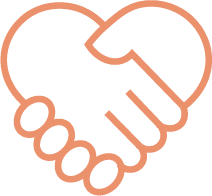Financial support in North Rhine-Westphalia: “A desire to have children should not fail because of money”.
Since 2019, couples in North Rhine-Westphalia have also been receiving financial support from the state for infertility treatment: The state government in NRW provided funding measures amounting to 3.7 million euros per year. This means that half of the 50% co-payment that married couples with an unfulfilled desire for a child have to pay themselves for assisted reproduction is covered. The other part is usually covered by the health insurance fund. So in the end, married couples only have to pay a quarter of the total costs themselves. But even those who are not married can count on subsidies amounting to 25% of the co-payment if the couple lives in a cohabiting relationship.
If you would like to take advantage of the financial subsidy, you must meet a few additional criteria. For example, you must be older than 25, but under 40 if you are a woman and under 50 if you are a man. The medical necessity must be given — i.e. infertility must be diagnosed — and the treatment must have a chance of success. Also, the funding is only available for three attempts, after which the chance of success is considered too low. You can read exactly how the requirements for funding are defined on the website of the NRW Family Ministry or in the corresponding legal text § 27a SGB 5. Unfortunately, no financial support is provided for same-sex / lesbian couples.
According to the Ministry of Family Affairs, the funding has also already had an effect, as it is in high demand. Family Minister Joachim Stamp commented as follows: “A desire to have children should not fail because of money. The high demand for the subsidies shows how important the state’s financial support for infertility treatments is for the couples concerned.”
Financial subsidies from the state are available in North Rhine-Westphalia for two types of fertility treatment: In Vitro Fertilization (IVF) and Intracytoplasmic Sperm Injection (ICSI). Below you will find more information about these methods. Responsible for the processing and approval of funding applications in NRW is the district government of Münster. Applications can be submitted online after registration.
In vitro, insemination or ICSI: Which methods are offered?
There are many treatment options available to fulful the desire to have a child. The individual clinics in North Rhine-Westphalia have different offers — find out in advance whether the treatment method you need is possible.
If a woman does not become pregnant despite regular unprotected sexual intercourse, this does not mean that assisted reproduction will be performed immediately. The first visit to a fertility center attempts to determine a diagnosis for the infertility, this is done using hormone tests. For women, the most important hormone to test is the Anti-Mullerian-Hormone (AMH). Whilst, for men, a spermiogram is likely to be performed, this is where the sperm cells are checked for viability and motility. Here it can be determined whether the sperm quality is sufficient for a natural pregnancy or whether, if necessary, additional help is needed.
Depending on the results from the diagnosis stage, a therapy will follow. A likely, relatively simple therapy may be insemination (IUI). Here, the sperm is qualitatively prepared and directed into the uterine cavity (intrauterine) or the fallopian tubes (intratubal) at the time of ovulation.
If the sperm quality or the conditions of the woman are not sufficient for this, there are other possibilities for assisted fertilisation. Probably the most widely-known is in vitro fertilization (IVF). Here, the egg and sperm are brought together in the laboratory and, if fertilisation is successful, inserted into the woman’s uterus.
Intracytoplasmic sperm injection (ICSI) works in a similar way. However, unlike IVF, here the sperm is injected directly into the egg. This is common when sperm quality is not sufficient for the other methods and it can increase the chance of pregnancy even in couples for whom it would not otherwise be possible.
Many fertility clinics also have a sperm bank. This addition can be an important option for couples where the man’s sperm quality is not sufficient for pregnancy, or for lesbian couples requiring a sperm donor to fulfil their desire to have a child. We at Fertilly would be happy to inform you about various fertility centers in NRW — you can book a consultation with one of our patient advisors here free of charge and without obligation.
Which options do I have?
There are many treatment options for the desire to have children, the aim of which is to fulfill the desire directly or indirectly. The individual clinics in North Rhine-Westphalia have different offers — in any case, find out in advance whether the method you want is included.
If a woman does not become pregnant despite regular unprotected sexual intercourse, this does not mean that assisted reproduction will be performed immediately. Rather, the first visit to a fertility center is initially about diagnostics, i.e. the question of what the problem is. In men, there is the spermiogram, in which the sperm cells are checked for viability and motility, among other things. Here it can be determined whether the sperm quality is sufficient for a natural pregnancy or whether, if necessary, additional help is needed.
After the diagnostics, the therapy follows, depending on your results. The first, relatively simple method is insemination (IUI). Here, the sperm is qualitatively prepared and directed into the uterine cavity (intrauterine) or the fallopian tubes (intratubal) at the time of ovulation.
If the sperm quality or the conditions of the woman are not sufficient for this, there are other possibilities of assisted fertilization. Probably the best known is in vitro fertilization (IVF). Here, the egg and sperm are brought together in the laboratory and, if fertilization is successful, inserted into the woman’s uterus.
Intracytoplasmic sperm injection (ICSI) works in a similar way. However, unlike IVF, here the sperm is injected directly into the egg. This is done in men whose sperm quality is not sufficient for the other methods and increases the chance of pregnancy even in couples for whom it would not otherwise be possible.
Many fertility clinics also have a sperm bank attached. This addition can be interesting for couples if, for example, the man’s sperm is not sufficient for pregnancy. On the other hand, lesbian couples can fulfill their desire to have children. We will be happy to inform you about various fertility centers in NRW — you can book a consultation with one of our patient advisors here free of charge and without obligation.
What are important criteria when choosing a fertility centre?
In order to fulfil your desire to have a child, you should choose a fertility clinic that meets your specific requirements and importantly where you feel comfortable. When choosing a clinic, there are a number of aspects to consider to ensure that the therapy goes as smoothly as possible. The success of a therapy depends on various factors. Both the experience and qualifications of the medical team and the technological status of the laboratory equipment (for example, whether the clinic has a clean room laboratory) can have an impact on the success rate.
In addition to the success rate, there are other issues that can be decisive in the selection process. Good counselling on the choice of therapy, as well as personal care and the availability of the doctor can help ensure your questions and concerns are answered. Hearing from the experiences of previous patients can also give an indication of the quality or shortcomings of a practice, this can also provide you with a level of confidence during the clinic selection process.
Another aspect to consider are the costs. To avoid surprises, fertility centres that maintain a high degree of price transparency are recommended. In the case of treatments with donor sperm, ensure there is a cooperation between the clinic and an experienced sperm bank, as they often offer a larger selection of donor profiles and have many years of experience in the field of sperm donation.
When selecting our partner clinics, we always make sure that both heterosexual and homosexual couples, as well as single women are treated.
Are you struggling to find a fertility centre that is right for you or do you have questions about available therapies and treatment methods? Our friendly team are happy to help you in a free consultation.
At Fertilly, we have made it our mission to accompany couples (homosexual and heterosexual) and singles on the way to fulfilling their desire to have a child. It is important to us to create transparency in the area of family planning and to inform you about success rates and prices.

fertility advisors





